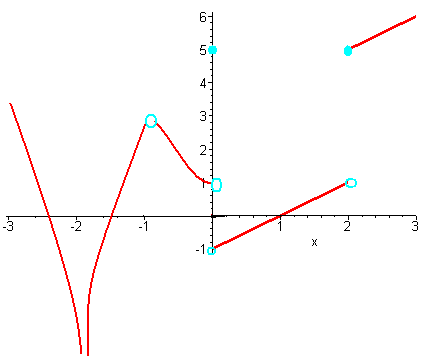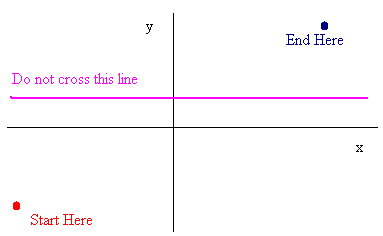What Must Be True for a Function to Be Continuous
Continuity
Continuity
If a graph has no holes asymptotes, or breaks then the function is continuous . Or if you can draw the function without lifting your pencil then it is continuous. Below is a formal definition.
Definition of Continuity A function is continuous at x = c if
![]()
Note that in order for a function to be continuous at a point, three things must be true:
-
The limit must exist at that point.
-
The function must be defined at that point, and
-
The limit and the function must have equal values at that point.

Notice that the function represented by the graph above is not continuous at
x = -2, x = -1, x = 0, and x = 2
Below is a list of function that are continuous.
Continuous Functions:
-
Polynomials
-
sin and cos
-
Rational Functions where the denominator is nonzero
-
Sums, Differences, and Products of continuous functions
-
Quotients of continuous functions where the denominator function is nonzero
-
Compositions of continuous functions
Examples:
The following are continuous:
-
y = x2 + 3x - 4
-
y = x sin x
-
1
y =
1+ x2
Exercises:
Determine whether the following are continuous. If they are not continuous, at which points are they discontinuous?
-
x - 1
y =
x + 1
-
x
y =
x2 + 3x - 4 -
y = { 2x + 3 for x < 1 3x - 2 for x > 1 -
y = { x2 for x < 2 5x - 6 for x > 2
-
For what value of k is the function continuous?
f(x) = { 3x2 -5 for x < 1 5x + k for x > 1
One Sided Limits
For a function with a break the limit does not exist, however it is still interesting to consider where the path is heading towards on the left side and where it heading on the right. For example if
|x|
f(x) =
x
then for x negative
f(x) = -1
while for x positive,
f(x) = 1
We write
and![]()
![]()
The Intermediate Value Theorem
Suppose a continuous function starts at the bottom left of the xy-plane and ends at the top right of the xy-plane. Now draw a horizontal line somewhere in the middle of the page. Can you draw a continuous function (that is without lifting the pencil from the paper) from the bottom left to the top right without crossing the line? The answer is certainly no. Try it! The intermediate value theorem formalizes this idea.

If f is continuous on [a,b] and
f(a) < k < f(b)
then there exists at least one number c in the closed interval [a,b] for which f(c) = k
In particular if f(a) and f(b) have different signs, then f has a root between a and b.
Example
Show that the curve defined by
y = 8x7 + x4 - 2x3 + x - 3
has a root between -1 and 1.
Solution
We apply the intermediate value theorem. The function
f(x) = 8x7 + x4 - 2x3 + x - 3
is continuous between -1 and 1, since it is a polynomial. We have
f(-1) = -8 + 1 + 2 - 1 - 3 = -9
and
f(1) = 8 + 1 - 2 + 1 - 3 = 5
Since
f(-1) < 0 < f(1) Here k = 0
By the Intermediate Value Theorem, there is a c between -1 and 1 with
f(c) = 0
Exercise:
Write psudocode to find a root of a function
Karl's Calculus
Visual Calculus
Ohio State Calculus
Weisstein's World of Mathematics
Interactive Calculus
UC Davis Calculus
Back to Math 105 Home Page
e-mail Questions and Suggestions
Source: https://ltcconline.net/greenl/courses/105/Limits/CONT.HTM